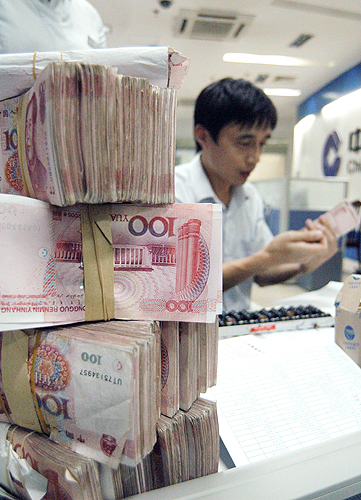|
 |
|
TOO MUCH CASH: Bank staff in Haian, Jiangsu Province, count renminbi bank notes (CFP) |
On May 4, the People's Bank of China, the central bank, released the China Monetary Policy Report for the first quarter of 2010, providing insight into the country's economic prospects.
While clouds gather over Western markets, the Chinese economy is steering a steady course of growth. Consumer demands remain buoyant and investments are picking up steam. Crisis-stricken exporters also regained some lost ground, providing a floor under the economy, said the report.
The economic resilience has laid a solid foundation for the financial markets to blossom. The bond and stock markets, for example, have showed signs of vitality, it said. The Shanghai Composite Index edged up 4.2 percent in the first quarter while the Shenzhen Component Index gained 0.8 percent.
The insurance industry boomed as well. By the end of March this year, the country's insurance assets had totaled 5.4 trillion yuan ($830.8 billion), soaring 25.9 percent from the previous year.
While the Chinese economy stages a powerful recovery, a bright outlook is not fully assured.
Globally, uncertainties still hang over the world economic landscape, requiring China to set up firewalls against possible risks. European debt woes continue to cause volatility in global capital markets while the devastating earthquake and subsequent tsunami drain life out of the Japanese economy, said the central bank report.
Meanwhile, developing economies have experienced a resurgence of capital inflows, adding to overheating risks.
Domestically, an acute concern is that inflationary jitters have become entrenched, casting an ominous shadow over the economy, said the report.
Imported inflation is taking hold as global commodity price surges ripple into China through trade links. China now relies on imports to meet more than 50 percent of its needs for crude oil, iron ores and copper. Adding fuel to inflation fears are also cost increases of labor and land.
In response, China vowed to continue attaching importance to stabilizing consumer prices and taming inflation.
The government pledged to use every tool at its disposal to manage liquidity, including changes to the reserve requirement ratio, interest rate and open market operations. So far this year, the central bank has raised interest rates twice, hiked the reserve requirement ratio five times and auctioned central bank bills worth 337 billion yuan ($51.8 billion).
To fend off the impact of fickle global commodity prices, efforts are needed to deepen reserves of important energies and raw materials, heighten resource efficiency and quicken resource pricing reforms, said the report.
But it is also necessary to strike a balance between maintaining growth and cooling inflation.
"Controlling inflation is now obviously a critical task given a healthy economy and vibrant employment markets," it added.
While policymakers gear up to further soak up excess liquidity, they will spare no effort to shore up weaker links in the economy. The central bank reiterated the importance of financing support to agriculture and small and medium-sized enterprises (SMEs) and consumption. By the end of March, outstanding loans for SMEs had grown 24.8 percent year on year, 21.6 percentage points faster than those for large enterprises.
In addition, China's economic rebalancing requires a clampdown on credit to polluting and energy-depleting industries, said the report.
On the currency front, the central bank said it will strengthen the flexibility of the exchange rate and keep the rate at a reasonable level.
More over, it will allow the renminbi to play a larger role in cross-border trade and investments in a bid to extend the Chinese currency's global presence. In the January-to-March period, renminbi settlement of cross-border trade totaled 360.3 billion yuan ($55.4 billion), an increase of 19 billion yuan ($2.9 billion) from the last quarter of 2010.
In another move, the real estate market continues to stretch the nerves of policymakers. In the past few years, soaring property prices have put homes beyond reach for working-class families, promoting the government to let air out of the housing bubble.
Among the measures, the government put a damper on financing to property developers and ordered purchase restrictions in major cities and increases in the supply of affordable homes for needy groups.
The key is to strictly implement the targeted policies and restore health of the real estate market, said the central bank report.
The efforts seem to be paying off. In the first three months, newly extended property loans nationwide amounted to 509.5 billion yuan ($78.4 billion), a decrease of 333.8 billion yuan ($451.4 billion) from the same period last year.
Plunging sales and capital shortages will mount pressure on developers to lower house prices, said Qin Hong, Deputy Director of the Policy Research Center under the Ministry of Housing and Urban-Rural Development.
Rather than focusing mainly on containing overall prices, the role of the economic and financial policy is to prevent different types of economic and financial risks from building up in the housing sector and make the economy and the financial system robust to a potential property downturn, said the World Bank.
As the country pushes forward affordable housing projects, it will be important to define "low income" and carefully identify the targeted beneficiaries, apportion the financing in a sustainable and transparent fashion, and work out implementation details, it said. | 